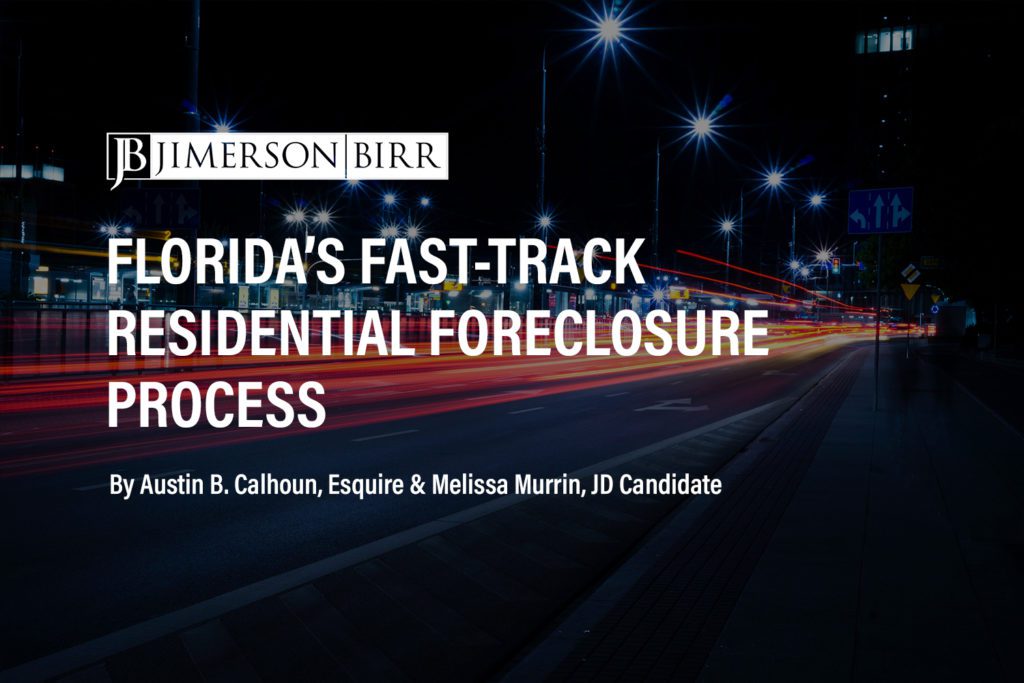Since 2013, residential foreclosure actions in Florida have been significantly shortened—from over two (2) years to possibly less than six (6) months—because of the new “fast-track” process provided in section 702.10, Florida Statutes. This fast-track foreclosure process starts with the filing of a “verified” foreclosure complaint that sufficiently alleges standing, along with a certificate of possession of the original promissory note or a lost note affidavit, followed with a request for an order to show cause. An order to show cause shifts the burden of proof to the defendants to show the court why foreclosure against them is improper. If a defendant fails to appear at the show cause hearing, provide defenses, or show good cause, the court will enter a final judgment of foreclosure.

Request an Order to Show Cause
Immediately after the filing of the verified foreclosure complaint, any “lienholder” may request an order to show cause for the entry of final judgment. A “lienholder” includes the plaintiff, named party defendants holding a lien, and any condominium association, cooperative association or homeowners’ association who “may file a lien” against the property. § 702.10(1), Fla. Stat. Once filed, the court shall immediately review the request and court file, in chambers without a hearing. If the court finds that the complaint is verified, complies with section 702.015, and alleges a cause of action to foreclose on real property, the court shall promptly issue an order directed to the other parties named in the foreclosure action to show cause why a final judgment of foreclosure should not be entered. § 702.10(1), Fla. Stat.
The lienholder who filed an order to show cause for the entry of final judgment must serve a copy of the order to show cause on the other parties in the foreclosure action, as follows:
- If a party has been served with the foreclosure complaint and original process, or the other party is the plaintiff in the foreclosure complaint, service of the order to show cause on that party may be made in the manner provided in the Florida Rules of Civil Procedure;
- If a defendant has not been served with the foreclosure complaint and original process, service of the order to show cause, together with the summons and a copy of the complaint, shall be served on the party in the same manner as provided by law for original process. § 702.10(1)(a)(9), Fla. Stat.
The order to show cause shifts the burden of proof to the defendants to show the court why foreclosure is improper. The defendants are given the opportunity to file defenses by a motion, a responsive pleading, an affidavit, or other papers that raise a “genuine issue of material fact,” which would preclude entry of summary judgment or otherwise constitute a legal defense to foreclosure. § 702.10(1)(a)(3), Fla. Stat.
Hearing to Show Cause
The hearing to show cause will occur the later of 20 days after service of the order to show cause, or 45 days after service of the initial complaint. § 702.10(1)(a)(1), Fla. Stat. The hearing time will be used to hear and consider whether the defendant’s motion, answer, affidavit, other papers, and other evidence and argument as may be presented at the show cause hearing, raise a “genuine issue of material fact,” precluding the entry of summary judgment or otherwise constitutes a legal defense to foreclosure. § 702.10(1)(a)(5), Fla. Stat.
If a defendant fails to appear at the hearing to show cause, fails to file defenses, or files an answer not contesting the foreclosure, such defendant may be considered to have waived the right to a hearing, and the court may enter a default against the defendant, and, if appropriate, a final judgment of foreclosure ordering the clerk of the court to conduct a foreclosure sale. § 702.10(1)(a)(6), Fla. Stat. If a defendant fails to show cause at the hearing, the court shall promptly enter a judgment of foreclosure. § 702.10(1)(d), Fla. Stat.
Conclusion
In Florida, any lienholder can use this “fast-track” process. However, only “in rem” relief is available under this process. Therefore, a separate proceeding is required to secure a deficiency judgment if the proceeds from the foreclosure sale are not enough. Nevertheless, under certain conditions, this “fast-track” process has allowed lienholders to bypass the lengthy foreclosure process and obtain a foreclosure in less than six (6) months.
Authors:
- Austin B. Calhoun, Esquire
- Melissa Murrin, J.D. Candidate 2021
Continued reading:

